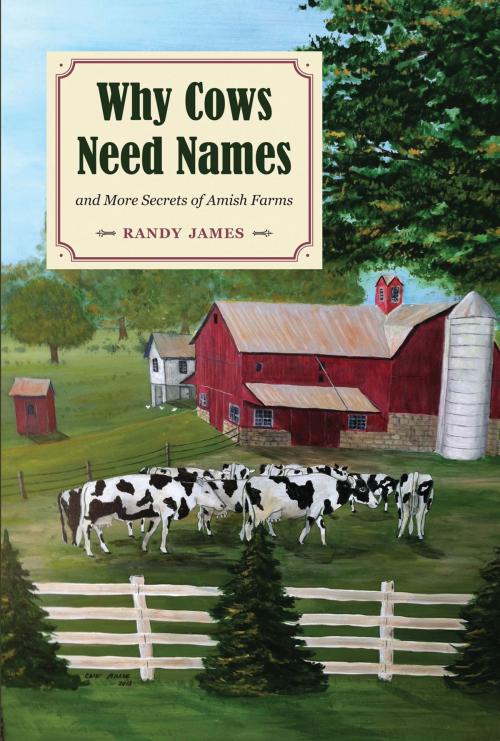Why Cows Need Names
And More Secrets of Amish Farms
Nonfiction, Religion & Spirituality, Christianity, Denominations, Anglicanism, Amish, Other Practices| Author: | Randy James | ISBN: | 9781612777009 |
| Publisher: | The Kent State University Press | Publication: | August 20, 2013 |
| Imprint: | The Kent State University Press / Black Squirrel Books | Language: | English |
| Author: | Randy James |
| ISBN: | 9781612777009 |
| Publisher: | The Kent State University Press |
| Publication: | August 20, 2013 |
| Imprint: | The Kent State University Press / Black Squirrel Books |
| Language: | English |
An inspiring glimpse into the struggles of a young Amish farm family
Agriculture continues to be the largest industry in the United States with over 2.2 million farms. Amazingly, well over 100,000 new small family farms have sprung up in the past few years . . . and almost no one noticed.
Why Cows Need Names follows one young Amish family as they dream about and then struggle to establish a profitable and quintessentially American small farm. The story starts with Eli Gingerich’s first timid phone call to author Randy James, the county agricultural agent in Ohio’s Geauga Amish Settlement—the fourth-largest Amish settlement in the world—and traces the family’s progress over the next five years. Through gentle dialogue and true stories, James captures the challenges of creating a simple business plan that will lead to the family’s radiant success or dismal failure. As the narrative unfolds, readers get a rare glimpse into what it’s like to work in the fields with draft horses; in the barn with cows, calves, children, and Chip the family dog; or to sit at the table talking with family and friends over a noontime meal. A picture emerges of how quietly living a shared goal and “doing without” during hard times can strengthen families and provide an appreciation for what is truly important in life.
In addition to the business aspects and day-to-day farm activities, James interweaves commentary on our complex relationships with animals. The stark differences in the way animals are treated and valued in agribusinesses versus on small family farms is a recurring theme, as is debunking the myth that bigger is always better in American agriculture.
Surrounded by a factory-farm world, the Gingerich family employs a business model that flatly rejects the dogma of “economies of scale” and instead focuses on the diversity, flexibility, and efficiency that only a small family farm can capture. Why Cows Need Names provides a partial roadmap, not only for other small farms but for the many thousands of family businesses that are created each year and largely ignored in our national psyche. It will appeal to anyone interested in business management, our food supply, animal welfare, and Amish family life.
An inspiring glimpse into the struggles of a young Amish farm family
Agriculture continues to be the largest industry in the United States with over 2.2 million farms. Amazingly, well over 100,000 new small family farms have sprung up in the past few years . . . and almost no one noticed.
Why Cows Need Names follows one young Amish family as they dream about and then struggle to establish a profitable and quintessentially American small farm. The story starts with Eli Gingerich’s first timid phone call to author Randy James, the county agricultural agent in Ohio’s Geauga Amish Settlement—the fourth-largest Amish settlement in the world—and traces the family’s progress over the next five years. Through gentle dialogue and true stories, James captures the challenges of creating a simple business plan that will lead to the family’s radiant success or dismal failure. As the narrative unfolds, readers get a rare glimpse into what it’s like to work in the fields with draft horses; in the barn with cows, calves, children, and Chip the family dog; or to sit at the table talking with family and friends over a noontime meal. A picture emerges of how quietly living a shared goal and “doing without” during hard times can strengthen families and provide an appreciation for what is truly important in life.
In addition to the business aspects and day-to-day farm activities, James interweaves commentary on our complex relationships with animals. The stark differences in the way animals are treated and valued in agribusinesses versus on small family farms is a recurring theme, as is debunking the myth that bigger is always better in American agriculture.
Surrounded by a factory-farm world, the Gingerich family employs a business model that flatly rejects the dogma of “economies of scale” and instead focuses on the diversity, flexibility, and efficiency that only a small family farm can capture. Why Cows Need Names provides a partial roadmap, not only for other small farms but for the many thousands of family businesses that are created each year and largely ignored in our national psyche. It will appeal to anyone interested in business management, our food supply, animal welfare, and Amish family life.















